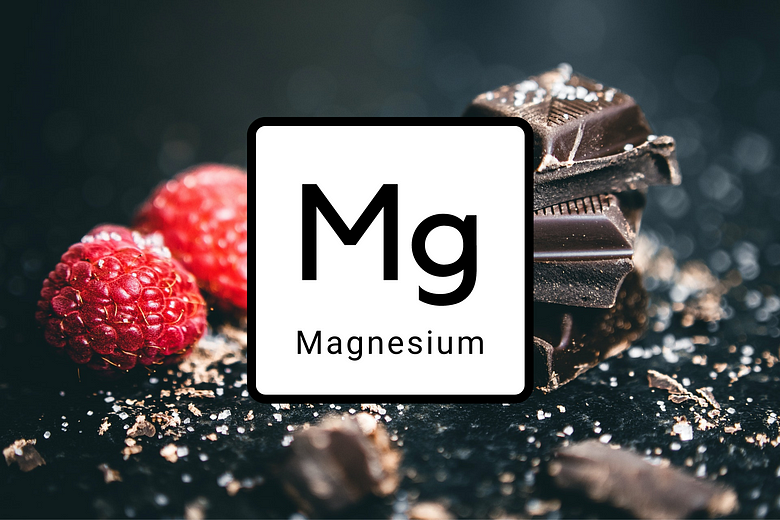
Back in the days of caves and ape-like cavemen roaming the plains with clubs, our food sources looked pretty different.
Scientists aren’t 100% sure what our diet was like back then. But they do have evidence¹ it probably consisted of a lot of meat, eggs, bone marrow, fruits, and some plants.
While we probably shouldn’t strive to live the life of a caveman — no one wants to die young, spread disease, or accuse Grock of not being able to count rock-votes properly — there are some useful things we can take into account.
One big part of the diet which hasn’t changed in the past 10,000 years is our bodies’ requirement for magnesium.
Back in the Paleolithic period, evidence suggests our ancestors would consume over 600 mg of the stuff in their diet every day.²
Today’s usual recommended amounts? At least 400 mg for adult men, and 310 mg for adult women.³
Yet, most of us don’t get anywhere near this amount in our diets. Up to 80% of all Americans are now thought to be deficient in the mineral.⁴
Much of our farmland is overused and depleted of natural minerals like magnesium. New medications and the proliferation of certain chronic diseases also have reduced our absorption rates.⁵
We are getting way less magnesium in our diets than ever before in history, and it’s not without consequences.
The cumulative effect may be driving many of our illnesses.
“Subclinical magnesium deficiency increases the risk of numerous types of cardiovascular disease, costs nations around the world an incalculable amount of healthcare costs and suffering, and should be considered a public health crisis”
The authors of this study even went as far as to call it a “public health crisis.”⁶
This is why magnesium should matter to you.
What can magnesium do for us?
There’s been a lot of research done on the role of magnesium over the years. It’s thought to be involved in more than 300 enzyme systems in the human body.⁷
One expert on the subject, Dr. Caryolyn Dean, even calls magnesium the ‘master mineral’ because it “tells the other minerals what to do and where to do it.”
And since so many people in the modern food supply chain are lacking in the essential substance, many of today’s modern ills may be at least partially influenced by this deficiency.
Do you ever get muscle cramps or experience general fatigue?
Muscle fatigue is commonly associated with a lack of magnesium and potassium. This is especially true if you’re finding you can’t complete the same level of workouts you used to be able to perform.
Even more so if you ever experience muscle cramps.
I used to get these a lot in my early adult years, especially in my calf muscles. There are few pains I’ve experienced first thing in the morning worse than waking up to my leg muscles wrestling each other under my skin.
My solution? I started eating bananas regularly, and they never occurred again.
Bananas are a great source of magnesium and potassium, go figure.
General feelings of fatigue?
While cramps can be an extreme temporary deficiency, a general feeling of weakness or unexplained consistent fatigue might be an indicator of a more long-term magnesium deficiency.
Some studies have also shown magnesium can significantly improve athletic performance by making glucose more available in their blood, muscles, and brains during exercise.⁸⁹
Lower your risk of type 2 diabetes
There’s a very strong correlation between high magnesium intake and not developing type 2 diabetes.¹⁰
For those diagnosed with type 2 diabetes already, this study’s participants started taking high doses of magnesium and experienced great improvements in their blood sugar and hemoglobin A1c levels.¹¹
Bottom line, if you’re worried at all about type 2 diabetes, you should look at how much magnesium your taking in daily.
Do you have a history of depression or anxiety?
Magnesium is thought to play an important role in the brain — affecting mood and anxiety levels. This study of 8,800 people showed those with the lowest amount of magnesium ingestion had a 22% higher risk of being depressed.¹²
If this is true and our society is generally consuming low levels of magnesium content, it may partially contribute to the increased rate of diagnosed depression and anxiety we’ve seen over the past few decades.¹³
High blood pressure
Several studies have looked at magnesium’s connection to blood pressure, especially for those in the unhealthy higher range.
This study measured a small decrease in blood pressure for those with hypertension, after supplementing with magnesium, with positive results.¹⁴
Another study looked at the combination of exercise, magnesium, and blood pressure.¹⁵ It found an inverse relationship between the supplement intake and mean resting systolic blood pressure. They concluded a low regular dietary magnesium intake would negatively affect blood pressure.
Get better sleep
A lack of magnesium in your system is known to be associated with poor quality and light sleeping patterns.¹⁶
When they studied older adults taking magnesium supplements, they came to similar conclusions. They also detected higher levels of renin and melatonin afterward.¹⁷
Both of these hormones help regulate and ensure a good night’s sleep.
Heart arrhythmia and heart health
One of the scarier symptoms of not getting enough magnesium intake is the higher potential for heart arrhythmia. This can even escalate in some cases to heart palpitations… or worse.¹⁸
Researchers think an imbalance of potassium levels may be to blame, which is directly correlated with a lack of magnesium in the body.
There’s also a correlation in some patients between lower levels of magnesium and arrhythmia.¹⁹ This specific group of people saw their conditions improve substantially after being treated with magnesium injections, which is great news.
Osteoporosis
As we grow older, the risk of our bones becoming weaker and having a higher chance at breaking can increase significantly. This is called osteoporosis when it occurs.
Luckily, there are ways to combat it — including solving any deficiencies in magnesium.
It’s not only a lack of calcium that’s involved in the development of osteoporosis. Magnesium is required for the calcium to be absorbed in the first place, so an absence of one can lead to a deficiency in the other.
This study showed patients with a magnesium deficit benefited substantially after being supplemented with magnesium.²⁰
Do you supplement with Vitamin D?
Alongside increasing the absorption rate of calcium, magnesium is imperative to vitamin D absorption too.
The Journal of the American Osteopathic Association states,²¹
“All of the enzymes that metabolize vitamin D seem to require magnesium, which acts as a cofactor in the enzymatic reactions in the liver and kidneys. Deficiency in either of these nutrients is reported to be associated with various disorders, such as skeletal deformities, cardiovascular diseases, and metabolic syndrome. It is therefore essential to ensure that the recommended amount of magnesium is consumed to obtain the optimal benefits of vitamin D.”
In light of the raging pandemic and hundreds of doctors around the world advising increased ingestion of vitamin D to combat infections and symptoms, this association with magnesium is even more important.²¹
How can you get more magnesium in your diet?
As with most vitamins and minerals essential to our body, the best way is to get them from the food we eat.
A few of the foods highest in magnesium, per serving, are:
- Pumpkin seeds
- Almonds,
- Spinach
- Cashews
- Peanuts
- Cereal like shredded wheat
- Soymilk
- Black beans
- Edamame
- Dark chocolate and cocoa powder
- Bread in whole wheat varieties
- Avocados
- Potatos with skin
- Brown rice
- Yogurt
- Oatmeal
- Kidney beans
- Bananas
If you find you aren’t able to consume the recommended amounts, as high as they are, magnesium supplements are a cheap and legal alternative.
Takeaway
If this long list of reasons hasn’t convinced concerned you, please remember that it’s thought up to 80% of Americans currently don’t get nearly enough of the mineral.
And it’s not your fault. Our agriculture isn’t setup these days to help us, and it’s especially the case with essential minerals like this.
So take a look at your own diet, do some quick number crunching to see how many milligrams you get each day, and if you’re lacking — change your diet or grab a supplement.
Good luck!
If you enjoyed this article, please join my free newsletter. Thanks for reading!
References
- https://slate.com/human-interest/2012/02/the-real-caveman-diet-what-did-people-eat-in-prehistoric-times.html
- https://www.ncbi.nlm.nih.gov/pmc/articles/PMC5786912/
- https://www.webmd.com/diet/supplement-guide-magnesium#1
- https://www.eatthis.com/news-americans-deficient-this-mineral/
- https://www.ncbi.nlm.nih.gov/pmc/articles/PMC5786912/
- https://www.ncbi.nlm.nih.gov/pmc/articles/PMC5786912/
- https://ods.od.nih.gov/factsheets/Magnesium-HealthProfessional/
- https://pubmed.ncbi.nlm.nih.gov/24465574/
- https://pubmed.ncbi.nlm.nih.gov/22760901/
- https://pubmed.ncbi.nlm.nih.gov/20807870/
- https://pubmed.ncbi.nlm.nih.gov/12663588/
- www.ncbi.nlm.nih.gov%2Fpubmed%2F25748766
- www.ncbi.nlm.nih.gov%2Fpubmed%2F16542786
- https://pubmed.ncbi.nlm.nih.gov/19617879/
- https://pubmed.ncbi.nlm.nih.gov/24149738/
- https://pubmed.ncbi.nlm.nih.gov/23969766/
- www.ncbi.nlm.nih.gov%2Fpubmed%2F23853635
- www.ncbi.nlm.nih.gov%2Fpubmed%2F7368975
- www.ncbi.nlm.nih.gov%2Fpubmed%2F10672134
- https://pubmed.ncbi.nlm.nih.gov/263326/
- https://jaoa.org/article.aspx?articleid=2673882#:~:text=Magnesium%20assists%20in%20the%20activation,in%20the%20liver%20and%20kidneys
- https://www.nutraingredients.com/Article/2020/12/21/Experts-send-Vitamin-D-and-Covid-19-open-letter-to-world-s-governments#




